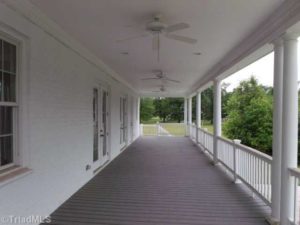North Carolina Court of Appeals Allows Section 75-1.1 Claim in the Context of a Residential Real Estate Transaction

Ellis & Winters
We have examined cases that explore exemptions to liability under N.C. Gen. Stat. § 75-1.1. The section 75-1.1 carve-outs include exemptions for securities transactions, internal business disputes, and employment matters.
Courts have also generally excluded residential real estate sales from the statute. A recent decision from the North Carolina Court of Appeals, called Capps v. McSwain, addressed this exemption. This post explores this decision—including the reasons behind the exemption.
Can a Sagging Deck Support 75-1.1 Liability?
During the summer of 2012, James and Sharon Capps attended an open house in Clemmons, North Carolina. BB&T was selling the home after it had foreclosed on the prior owners. At the open house, the Capps noticed that the home’s deck appeared to be sagging. Realtor.com includes a picture of the home’s deck from a prior MLS listing:
Given their concerns, the Capps “inquired about the deck”—the Complaint does not make clear whether the Capps’ concern was raised to the seller or someone else. Mr. Capps “was provided” with a report issued by GeoScience addressed to Steve McSwain, a member-manager of Maplestone Construction, LLC. Again, the Complaint does not specify who provided the report to the Capps. The report identified several required repairs to make the deck structurally sound.
Mr. Capps hired an architect to follow up on his concerns about the deck. Together, they met McSwain at the home to inspect the deck. At the meeting, McSwain represented that the repairs identified in the GeoScience report had been completed and the deck complied with code. McSwain also removed a ceiling panel under the deck to demonstrate that the repairs had been made.
Mr. Capps’s architect later spoke with an employee at GeoScience. That employee assured the architect that the deck was structurally sound.
The Capps then agreed to purchase the home in 2013 for $675,000. They entered into a purchase agreement with BB&T that specified that the property was being sold “as-is.” The purchase agreement also required the Capps to conduct their own diligence.
By 2015, the Capps noticed that the deck had continued to sag. Mr. Capps hired a local builder to inspect the deck. The builder reported that the deck was dangerous and did not meet code.
The Capps then sued GeoScience, McSwain, and Maplestone Construction in Forsyth Superior Court. The complaint included a claim for fraud and an alleged violation of section 75-1.1. The Capps did not sue BB&T, the seller of the home.
The defendants successfully moved to dismiss. The Capps appealed. (GeoScience was later dismissed from the appeal, so the Court of Appeals only considered the claims against McSwain and Maplestone.)
The Court of Appeals Revives the Section 75-1.1 Claim
The parties’ appellate arguments focused primarily on whether the Capps had adequately alleged justifiable reliance. The defendants argued that the Capps knew of the deck’s problems and should have properly inspected the deck. The defendants also relied on the BB&T purchase agreement’s “as-is” sale provision and requirement that the Capps to conduct their own investigation.
Neither party, however, expressly addressed the residential real estate exemption and whether it applied to this case. This exemption did not escape the attention of the Court of Appeals, which began its analysis by noting that the “mere purchase and sale of a residence” is not an act in or affecting commerce under section 75-1.1.
The court then declined to apply the exemption. Why? The Court of Appeals explained that, in this case, the “defendants did not sell the house to plaintiffs, and claims for unfair and deceptive trade practices are not limited to a particular type of business relationship.”
This conclusion appears to rest on two sources of reasoning.
First, the Court of Appeals seemed to construe the exemption in a narrow fashion—that is, as applying only to claims between buyers and sellers of the real estate. Because the seller was not one of the defendants, the real estate exemption did not apply.
Second, the Court of Appeals explained that neither a fraud claim nor a section 75-1.1 claim mandate any particular type of relationship between the plaintiff and the defendant. Here, for example, the fact that the Capps had not contracted with any defendant did not undermine their claims.
The Court of Appeals did not expressly address the argument that, as a matter of law, the Capps unreasonably relied on the alleged misrepresentations. Its reversal of the trial court’s ruling, however, implicitly concluded that, at the Rule 12(b)(6) stage, the allegations of intentional misrepresentation were sufficient to overcome the Capps’s failure to investigate.
The Downstream Effects of the Court of Appeals’ Decision
Capps provides at least two important data points on the relationship between the parties and the requirements of section 75-1.1.
On the one hand, the Court of Appeals determined that the residential real estate exemption applies only to 75-1.1 claims between buyers and sellers. This reasoning means that putative plaintiffs who desire treble damages must look outside the buyer-seller relationship to find potential defendants who were involved with the sale in some other way.
On the other hand, the Court of Appeals recognized that 75-1.1 liability does not hinge on the precise nature of the relationship between the plaintiff and defendant.
Author: Jeremy Falcone


